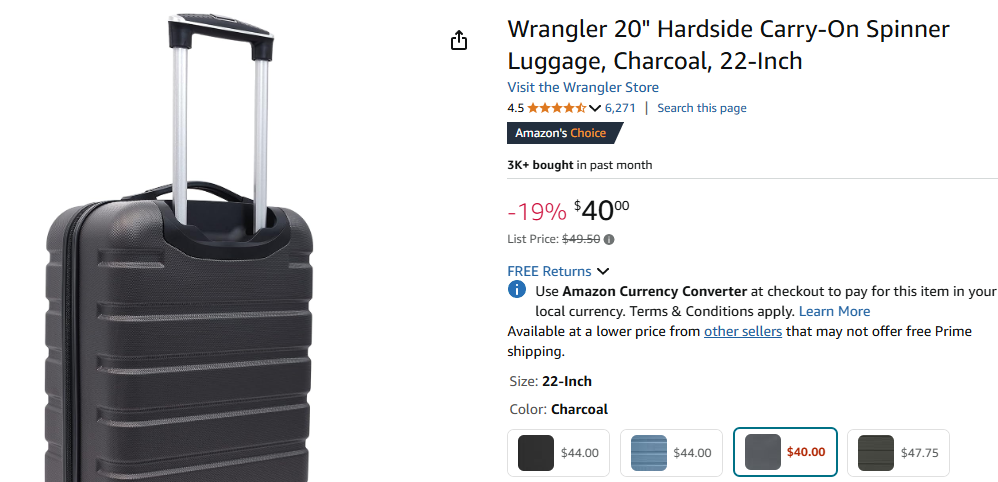Dreaming of a European adventure, hitting the open road, and exploring everything from charming villages to bustling cities? Renting a car can be your ticket to the ultimate travel freedom, allowing you to traverse far-flung destinations at your own pace. But beware, as common car rental missteps can quickly turn your trip into a logistical headache. Learning about potential pitfalls, such as understanding international driving permits, avoiding hefty cross-border fees, and steering clear of costly fueling mistakes, could mean the difference between a smooth journey and a troublesome ordeal.
Nik and Allie from Away Together are here to help you navigate these potential challenges with ease. Their video highlights five major errors travelers often make when renting cars in Europe, providing practical solutions to avoid them. Whether you’re exploring rural landscapes or bustling metropolises, understanding rental terms, evaluating insurance coverage, and knowing local driving laws will keep your European escapade on track. Don’t let avoidable errors derail your adventure; arm yourself with these essential tips and enjoy a hassle-free trip.

This image is property of i.ytimg.com.
Overlooking the Necessity of a Car
When planning a trip to Europe, it’s easy to assume that renting a car is the most convenient solution for your travel needs. While this might be true for some, many travelers often overlook the necessity of evaluating other transportation options, especially given Europe’s extensive public transportation systems.
Evaluate public transportation options
Before deciding to rent a car, take the time to evaluate the public transportation options available in your destination. Europe boasts a well-connected rail network, making train travel a highly efficient and often more affordable means of transportation between cities and even some rural areas. Many cities also have excellent bus, tram, and subway systems, which can save you the hassle of parking and driving in congested areas. By exploring these options, you may find that traveling by train or bus not only saves you money but also offers a more relaxed and scenic way to experience Europe.
Consider the flexibility and costs
While a rental car can offer unparalleled flexibility, it’s important to weigh this against the costs involved. Consider not only the price of the rental itself but also additional expenses like fuel, parking fees, and any tolls you may encounter on your journey. In urban areas, the costs of parking can be exorbitant, and the frustration of navigating busy city streets might outweigh the convenience of having your own vehicle. Use your itinerary to determine if a car is necessary for your trip, especially if you plan to spend most of your time in cities with robust public transportation.
Explore rail networks for budget-friendly travel
Europe’s rail network is a traveler’s best friend when it comes to budget-friendly travel. With options ranging from high-speed trains to scenic regional routes, you can access virtually any destination across the continent. Rail passes such as the Eurail Pass offer an economical means to travel long distances without the need for a car. Moreover, trains can take you from city center to city center, saving you valuable vacation time otherwise spent on airport transfers or navigating from the outskirts of town to the heart of the action.
Ignoring Local Driving Laws and Regulations
Renting a car can be an excellent way to explore Europe’s countryside and lesser-known spots, but doing so without a solid understanding of local driving laws and regulations can lead to significant headaches and expenses.
Understand the need for an International Driver’s Permit
When planning to drive in Europe, it’s crucial to check whether you need an International Driver’s Permit (IDP). Although many countries accept U.S. and Canadian driver’s licenses, some require this permit as an additional documentation for tourists. The IDP is relatively easy and inexpensive to obtain and serves as a translation of your driver’s license, which can be useful if you find yourself in an unexpected situation requiring proof of your driving capabilities.
Be aware of ‘no drive’ zones to avoid fines
European cities often feature ‘no drive’ or low-emission zones where access is limited or restricted to certain vehicles. Entering these zones without the necessary permit or compliance can result in hefty fines. Before you drive in an unfamiliar area, research these restrictions to avoid unnecessary penalties and ensure you’re respectful of local regulations.
Research local speed limits and traffic signs
Driving in Europe requires familiarity with local speed limits and traffic signs. Speed limits can vary significantly from one country to another and are often enforced by cameras rather than patrol units, leading to automated fines if violated. Likewise, understanding the meaning of common European road signs, which may look different from those back home, is crucial for safe and stress-free driving.
Not Checking Border Crossing Rules
Europe’s open borders can be inviting for road trips, but crossing them with a rental car isn’t always straightforward. Each country can have different rules that can impact your travel plans significantly.
Identify insurance requirements for crossing borders
Before crossing any international border within Europe, it’s essential to verify your insurance coverage. Some rental car agencies require specific supplemental insurance for cross-border travel. Ensure you have the necessary coverage to avoid any unwelcome surprises if you encounter issues while on the road in a different country.
Be prepared for potential fees with border crossings
Crossing borders in a rental car can sometimes incur extra fees. Rental agencies may charge additional costs for taking their vehicles across national borders, and neglecting to inform them of your travel plans may void your contract. To avoid these pitfalls and ensure a smooth journey, inform the rental company of your itinerary and confirm any additional fees in advance.
Coordinate with rental companies about international travel
Communicating with your rental company about your intent to travel internationally is crucial. Different agencies have various policies about where their cars can be driven. By coordinating these details ahead of time, you can ensure that your travel is compliant with all contractual agreements and understand any limitations on your route. This preventive measure can help you avoid penalties and ensure a stress-free trip.
Choosing Incorrect Car Features
Choosing the right features for your rental car can make or break your driving experience in Europe. Selecting the appropriate vehicle type and additional amenities is crucial for a comfortable and hassle-free journey.
Make sure to choose the right transmission: manual vs. automatic
One of the most significant decisions you’ll face is whether to choose a manual or automatic transmission. In Europe, manual cars are more prevalent and, consequently, often cheaper to rent. If you’re comfortable driving a manual, this can be a cost-effective option. However, if you’re not accustomed to it or prefer the ease of an automatic, be sure to book in advance, as automatics tend to be in limited supply and more expensive.
Check availability and costs for GPS and other add-ons
Having GPS in your rental car can be a lifesaver when navigating unfamiliar roads. While many travelers rely on their smartphones, renting a car with a built-in GPS can provide additional peace of mind, especially in areas with spotty mobile coverage. Additionally, consider any other add-ons you might need, such as child seats or Wi-Fi access, and factor these into your budget.
Consider size and style requirements for your group
Before finalizing your rental, consider the size and style of the vehicle that will best accommodate your group’s needs. Think about luggage space, seating, and comfort, especially if you plan on long drives. A compact car might be perfect for a couple traveling light, but a family or group of friends might need something more spacious. Balancing cost with comfort is key to ensuring an enjoyable experience on the road.

Failing to Verify Fuel Type
One costly and common oversight when renting a car abroad is failing to verify the correct fuel type required for your rental vehicle.
Check the car’s fuel type to avoid costly mistakes
Misfuelling is one of the most inconvenient and potentially expensive mistakes you can make with a rental car. Before hitting the road, confirm whether your vehicle takes petrol or diesel. Rental agencies typically note this on the car or the key ring, but it’s always good to double-check to avoid causing significant mechanical damage and ensuing repair costs.
Learn how to refuel in local currency – cash or card
Understanding how to pay for fuel in your destination country can prevent hiccups at the pump. In some places, credit cards are the norm, while others may prefer cash. Being prepared with the local currency can help streamline the refueling process. It’s also wise to familiarize yourself with the payment system at local gas stations to avoid unnecessary delays or confusion.
Familiarize yourself with local fuel stations and hours
Knowing the locations and operating hours of fuel stations along your route is essential, especially in rural areas where services may be sparse or close early. Proper planning ensures that you’re never caught off guard with an empty tank and a closed station.
Underestimating Rental Car Insurance
Understanding rental car insurance can save you from unnecessary stress and unexpected expenses. Ensuring you have the right coverage is vital for a smooth and worry-free trip.
Discover benefits of credit cards offering primary rental insurance
Many credit cards offer primary rental insurance as a benefit, which can cover potential damages or theft of the rental car. This benefit can eliminate the need for costly insurance options provided by the rental agency, saving you money. Familiarize yourself with your credit card’s policies to maximize these perks.
Determine the need for additional coverage
Even with credit card coverage, some travelers may feel more secure with the additional coverage offered by rental companies. Assess the risks of your trip and decide if additional options like collision damage waivers or personal effects coverage are necessary for your peace of mind.
Understand the specifics of insurance coverage options
Insurance terms can be complex, so understanding the specifics of each coverage option is vital. Ensure you’re clear on what is genuinely covered under your policies, including exclusions and limits. This knowledge will help you avoid paying for unnecessary coverage while ensuring you’re protected in any situation.

Overlooking Hidden Fees and Extra Costs
Renting a car can come with a slew of hidden fees and extra costs that can quickly add up if you’re not vigilant.
Be wary of extra driver fees
Many rental agencies charge additional fees for extra drivers. If more than one person plans to drive during your trip, confirm these fees in advance. Consider consolidating driving responsibilities to one primary driver to avoid these costs.
Understand fees for one-way rentals, especially cross-border
One-way rentals, especially those that cross international borders, often incur high fees. These charges can be excessive, so planning your route to return the car to the original pickup location can result in substantial savings. Always read the fine print to fully understand these charges before booking.
Investigate cancellation fees and policy details
Life is unpredictable, and travel plans can change. Renting from companies with lenient cancellation policies can save you money if your itinerary changes. Always inspect the terms of your rental agreement to understand the ramifications and costs of a potential cancellation.
Ignoring the Return Policies
Returning your rental car might feel like the end of your worries, but ignoring the return policies can result in unexpected costs.
Assess the costs of returning cars in a different city or country
Returning your rental car to a different city or country can become very costly. These fees can significantly impact your travel budget, so assess whether the convenience outweighs the costs for your itinerary and travel plans.
Check for additional charges for late returns
Late returns can incur significant penalties depending on your rental agreement. Understand the return time and grace period to avoid any additional costs. If you anticipate arriving late, let your rental company know ahead of time to explore potential accommodations.
Review the fuel policy before return to avoid surcharges
Most rental companies require you to return the car with a full tank of fuel. Failing to top off could result in high refueling charges, sometimes at rates well above standard fuel prices. Familiarize yourself with the fuel policy and plan your last fill-up accordingly.
Neglecting Local Culture and Language Barriers
Renting a car in a foreign country involves more than just handling the vehicle. Being aware of cultural nuances and potential language barriers is also important.
Learn basic phrases if driving in non-English speaking regions
Learning a few basic phrases in the local language can go a long way in helping you navigate road signs, ask for directions, or communicate with locals if needed. Common phrases related to driving can be particularly useful throughout your journey.
Familiarize yourself with local etiquette and customs
Driving etiquette and customs can vary greatly from country to country. Understanding the local driving culture can help you blend in more seamlessly and avoid misunderstandings on the road. Research common practices and adapt to driving in a way that respects local norms.
Prepare for different attitudes and styles of driving
Drivers around the world exhibit different styles and attitudes. Preparing yourself for variations in driving habits—from aggressive urban driving to leisurely countryside cruising—can help you stay calm and focused, making your trip more enjoyable and stress-free.
Conclusion
Avoiding these common pitfalls can significantly protect the enjoyment and success of your dream European trip. By embracing knowledge and preparation as your companions on the road, you can safeguard your travel experiences from unforeseen difficulties. Enjoy the journey with newfound confidence in your well-informed travel choices, allowing you to fully engage with and appreciate the diverse landscapes and cultures that Europe has to offer.
Some of the links on this site are affiliate links, which means I may earn a small commission if you click on them and make a purchase, at no additional cost to you. As an Amazon Associate, I earn from qualifying purchases.

